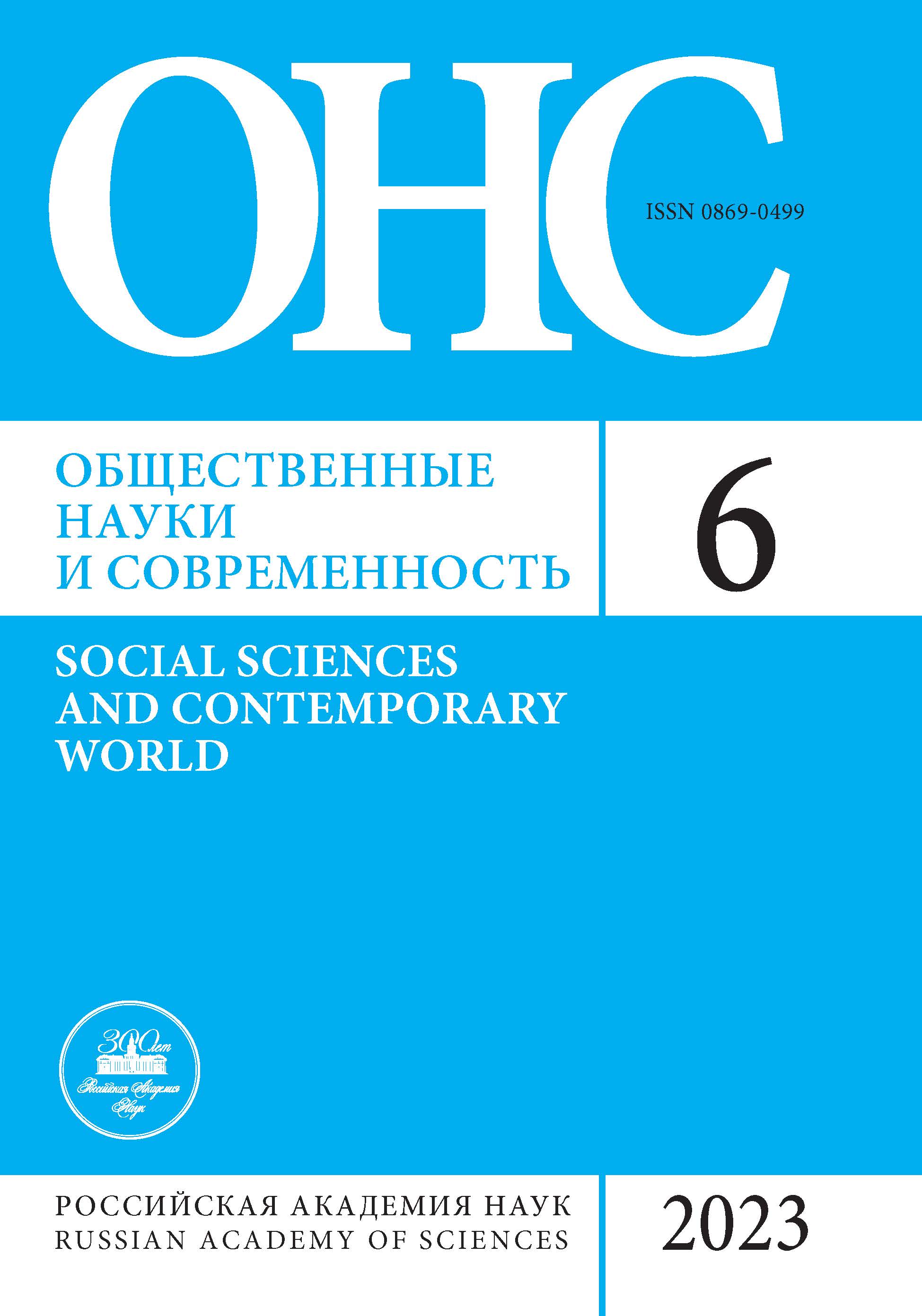Spatial dimension of subjective well-being
- Authors: Goffe N.V.1
-
Affiliations:
- Primakov National Research Institute of World Economy and International Relations, Russian Academy of Sciences
- Issue: No 6 (2023)
- Pages: 75-86
- Section: Articles
- URL: https://journals.eco-vector.com/0869-0499/article/view/675145
- DOI: https://doi.org/10.31857/S0869049923060060
- EDN: https://elibrary.ru/MRGLOH
- ID: 675145
Cite item
Abstract
The rural-urban paradox of happiness is examined that, in developed countries, manifests itself in higher life satisfaction of rural residents compared to urban residents. This topic has become increasingly important due to the dynamics of urbanization and the overwhelming majority of the global population settling in urban areas. Based on the analysis of statistical data and foreign literature, the aim of the study is to highlight the issues associated with defining the paradox and analyze various approaches to this topic. As the cost of living in urban areas rises, the paradox might become more pronounced, and the territorial differentiation of subjective well-being is likely to increase. In this scenario, human civilization will face fundamental challenges relating to the future of cities and the spatial distribution of the global population.
About the authors
Nina V. Goffe
Primakov National Research Institute of World Economy and International Relations, Russian Academy of Sciences
Email: nina-goffe@yandex.ru
Moscow, Russia
References
- Гоффе Н.В., Монусова Г.А. (2020) Восприятие социальных реалий и субъективное благополучие в развитых странах. М: ИМЭМО. 166 c. doi: 10.20542/978-5-9535-0580-2
- Родионова Л.А. (2013) Счастлив ли русский человек? // Известия Саратовского университета. Новая серия. Серия: Экономика. Управление. Право. Т. 13. № 3(1). С. 254-261.
- Тихонова Н.Е. (2015). Удовлетворенность россиян жизнью: динамика и факторы // Общественные науки и современность. № 3. С. 19-33.
- Шабунова А.А., Морев М.В. (2013). Представления вологжан о счастье // Экономические и социальные перемены: факты, тенденции, прогноз. № 1(25). С. 137-150.
- Шматова Ю.Е., Морев М.В. (2015) Измерение уровня счастья: литературный обзор российских и зарубежных исследований // Экономические и социальные перемены: факты, тенденции, прогноз. № 3 (39). С. 141-162. doi: 10.15838/esc/2015.3.39.11
- Berry B., Okulicz-Kozaryn A. (2011) An Urban-Rural Happiness Gradient // Urban Geography. Vol. 32. Issue 6. Pp. 871-883. https://doi.org/10.2747/0272-3638.32.6.871
- Burger M.J. et al. (2020) Urban-rural happiness differentials across the world // In: World Happiness Report 2020. Eds: J. F. Helliwell, R. Layard, J. Sachs, J.-E. De Neve. New York: Sustainable Development Solutions Network. Gallup World Poll. Pp. 67-94.
- Carlsen F., Leknes S. (2022) The paradox of the unhappy, growing city: Reconciling evidence // Cities, vol. 126. https://doi.org/10.1016/j.cities.2022.103648
- Coulibaly T.Y., Managi S. (2022) Populations in slums are happier than rural populations: The case of Mumbai // Land Use Policy, vol. 122, no. 11. 106341. https://doi.org/10.1016/j.landusepol.2022.106341
- Diener E. (1984) Subjective Well-being // Psychological Bulletin. Vol. 95. Issue 3. Pp. 542-575.
- Easterlin R.A., O'Connor K.J. (2020) The Easterlin Paradox // IZA Discussion Paper Series No. 13923.
- Elmassah S., Hassanein E. A.(2022) Digitalization and Subjective Wellbeing in Europe // Digital Policy, Regulation and Governance. Vol. 24. Pp. 52-73. doi: 10.1108/DPRG-05-2021-0060
- Florida R. et al. (2013) The Happiness of Cities // Regional Studies. Vol. 47. Issue 4. Pp. 613-627. https://doi.org/10.1080/00343404.2011.589830
- Helliwell J. F. et al. (2018) How Happy are your Neighbours? Variation in life Satisfaction among 1200 Canadian Neighbourhoods and Communities // NBER Working Paper No. 24592. doi: 10.3386/w24592.
- Jebb A.T. et al. (2018) Happiness, income satiation and turning points around the world // Nature Human Behavior. Issue 2. Pp. 33-38. https://doi.org/10.1038/s41562-017-0277-0
- Johansen P.H. et al. (2023) Introducing rural quality of life // In: Rural quality of life. Eds: P.H. Johansen, A. Tietjen, E.B. Iversen, H.L. Lolle, J.K. Fisker. Manchester. Manchester University Press. 2023. Pp. 4-13.
- Lenzi C., Perucca G. (2021) Not too close, not too far: Urbanisation and life satisfaction along the urban hierarchy // Urban Studies. Vol. 58. Issue 13. Pp. 2742-2757. https://doi.org/10.1177/0042098020962397
- Morrison Ph.S. (2011) Local expressions of subjective well-being: The New Zealand experience // Regional Studies. Vol. 45. Issue 8. Pp. 1039-1058. doi: 10.1080/00343401003792476
- Saad L. (2021) Country Living Enjoys Renewed Appeal in U.S // Gallup Politics (https://news.gallup.com/poll/328268/country-living-enjoys-renewed-appeal.aspx)
- Sørensen J.F.L. (2014) Rural-Urban Differences in Life Satisfaction: Evidence from the European Union // Regional Studies. Vol. 48. Issue 9. Pp. 1451-1466. https://doi.org/10.1080/00343404.2012.753142
- Yu Z., Wang F. (2017) Income Inequality and Happiness: An Inverted U-Shaped Curve // Frontiers in Psychology. Vol. 8. https://doi.org/10.3389/fpsyg.2017.02052
Supplementary files










